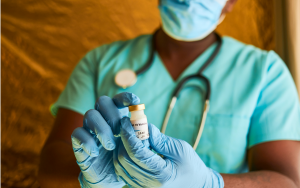Africa is getting ready to roll out COVID-19 vaccines
Brazzaville – Africa marked the move from planning to action in the rollout of COVID-19 vaccines at a World Health Organization (WHO)-hosted African Health Ministers meeting on 17 February, as a rapid vaccine rollout is expected in the wake of the WHO listing of two versions of the AstraZeneca-Oxford COVID-19 vaccine for emergency use.
In a significant step forward for the African region, national deployment and vaccination plans for COVID-19 vaccines from 35 low-income African countries eligible for free vaccines from the COVAX Facility have been accepted by an independent regional review committee. The plans are required for countries to receive vaccines from COVAX, the global initiative to ensure fair access to COVID-19 vaccines led by WHO, Gavi, the Vaccine Alliance, and The Coalition for Epidemic Preparedness Innovations (CEPI).
While the regional committee of over 100 experts from six leading global public health bodies certified the deployment plans, it called for more work on setting up systems to manage the logistics and supply chain for vaccines, reaching refugees, migrants and internally displaced people and financing national vaccination campaigns.
“Africa is revving up to rollout COVID-19 vaccines. These thorough vaccine preparation plans will help ensure African countries can hit the ground running in quickly immunizing the most vulnerable people. Meticulous planning is key to ensuring vaccines reach all priority groups, wherever they are, in every single African country,” said Dr Matshidiso Moeti, WHO Regional Director for Africa.
Dr Moeti briefed Health Ministers on the region’s overall state of readiness for Africa’s largest-ever immunisation drive, planned vaccines delivery dates and next steps, including documentation required by COVAX related to regulatory readiness, indemnity and liability agreements so vaccine manufacturers can schedule shipment dates.
“COVAX is open for business. Thanks to secured avenues of supply through manufacturer deals and dose-sharing, clarity on global and regional supply forecasts, additional much-needed funding, and countries’ hard work to ensure readiness – the world now has its clearest pathway yet to ending the acute stage of this pandemic, globally.” said Thabani Maphosa, Managing Director, Country Programmes, GAVI.
The move to roll out COVID-19 vaccines comes as new evidence shows new variants of the virus are spreading across the continent. In all the African countries that have detected the new variants, the pandemic spread faster in the second wave than in the first one. Variant 501Y.V2 [also known as B1.351] first identified in South Africa is predominant in South Africa and Zambia and has been detected in a total of nine African nations including Botswana, Comoros, Ghana, Kenya, Mozambique, South Africa, Tanzania, Zambia and Zimbabwe. The VOC202012/01variant [also known as B1.1.7] first detected in the United Kingdom has been found in six African countries, Gambia, Ghana, Morocco, Nigeria, Senegal, South Africa.
Countries are strongly urged to use the AstraZeneca vaccine even if the SARS-CoV-2 new variants are present. A small South African study has found the vaccine was not very effective against mild and moderate cases infected with the 501Y.V2 variant. After a review of all available data the WHO Strategic Advisory Group of Experts concluded that ongoing research suggests that the Astra Zeneca vaccine is likely to protect people against severe COVID-19. However, this remains to be demonstrated in clinical trials and post-implementation evaluation.
“Our priority must be to protect the most vulnerable from severe illness and death. Along with rolling out safe and proven vaccines, we must also work towards a diverse vaccine portfolio. At the same time, manufacturers must be prepared to adjust to mutations of the virus, including potentially providing booster shots and adapted vaccines,” said Dr Moeti.
WHO is helping countries ramp-up sequencing capacities to detect new variants. Since December 2020, there has been a 50% increase in sequences produced by over 30 African countries.
Communications and marketing officer
Tel: + 242 06 520 65 65 (WhatsApp)
Email: boakyeagyemangc [at] who.int (boakyeagyemangc[at]who[dot]int)
Communications Manager
WHO Regional Office for Africa
Email: okas [at] who.int (okas[at]who[dot]int)
Tel: +242 06 508 1009



